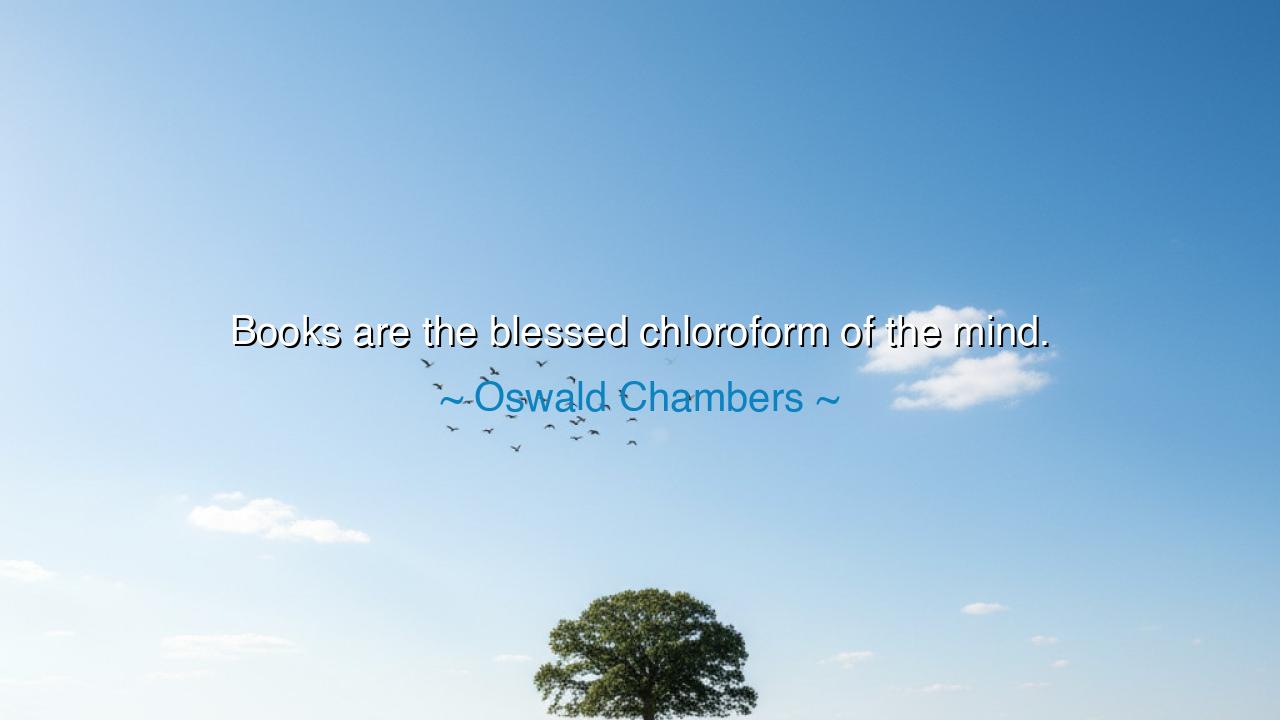
Books are the blessed chloroform of the mind.






“Books are the blessed chloroform of the mind.” So spoke Oswald Chambers, the Scottish preacher and teacher whose words often cut through the vanity of the age and reached for the deeper essence of the soul. His phrase is strange to the ear, yet rich in meaning, for he likens books not to weapons or treasures, but to chloroform—that strange substance which soothes pain, quiets turmoil, and lulls the restless body into silence. In his view, the written word is not only a teacher, but also a balm. It can still the storm of the mind, silence its anxieties, and grant the weary soul a moment of holy rest.
The blessing of books lies in their power to release us from the immediate burdens of life. A troubled mind, wandering in circles of worry, may open the pages of a good book and find itself carried to another realm—whether of wisdom, beauty, or story. Just as chloroform eases the pain of the body, so books ease the ache of the spirit, offering a brief escape, not through forgetfulness, but through vision. They remind us that life is larger than our own troubles, that truth and beauty endure even when sorrow presses hard upon us.
Chambers himself lived in a time of turbulence, through war and spiritual struggle. He knew well that many turned to books not merely for knowledge, but for comfort. And indeed, the tradition is ancient. The psalms of David, written in times of exile and despair, have for centuries served as such chloroform for the hearts of the broken. Likewise, in the prisons of the world, men and women have clung to books as their solace. Consider Nelson Mandela, who, during his long years of imprisonment, turned to Shakespeare. In the words of the bard, he found peace, perspective, and strength. The plays did not change his chains, but they soothed the torment of his soul, reminding him that the struggles of man are universal, and endurance is always possible.
Yet Chambers’s words are not only about comfort, but also about caution. For chloroform, if overused, can numb too much, leaving one passive and unseeing. So too with books: if they are consumed only as escape, they may lull the mind into slumber rather than awakening it. A book may soothe, yes, but it must also sharpen. It may calm the heart, but it should also rouse the will to face life with renewed strength. To seek only numbness in books is to misuse their blessing; but to let them refresh us for the struggles of the day—that is to honor their true gift.
The lesson, therefore, is balance. Seek in books both rest and awakening. Let them carry your mind away from the fever of daily cares, but return with their wisdom to live more bravely. Let novels teach you empathy by living other lives; let poetry quiet the storm with beauty; let wisdom literature sharpen your vision. But do not hide forever in their pages, for the world still waits for your courage and your deeds.
So I say to you: when your spirit grows weary, take up a book, and let its words be to you as blessed chloroform, soothing the mind, steadying the soul, and granting you a moment’s peace. Yet rise again from that rest renewed, ready to live, to love, and to labor. For books are not only escapes; they are wells of strength. Drink deeply, but then walk boldly back into the world.
Remember the wisdom of Chambers: “Books are the blessed chloroform of the mind.” They are gifts given to steady us when life’s storms rage. Treat them with reverence, use them with wisdom, and let them be both your comfort in the night and your strength at dawn. Thus shall you find in books not an opiate that dulls life, but a holy medicine that makes you whole.






AAdministratorAdministrator
Welcome, honored guests. Please leave a comment, we will respond soon